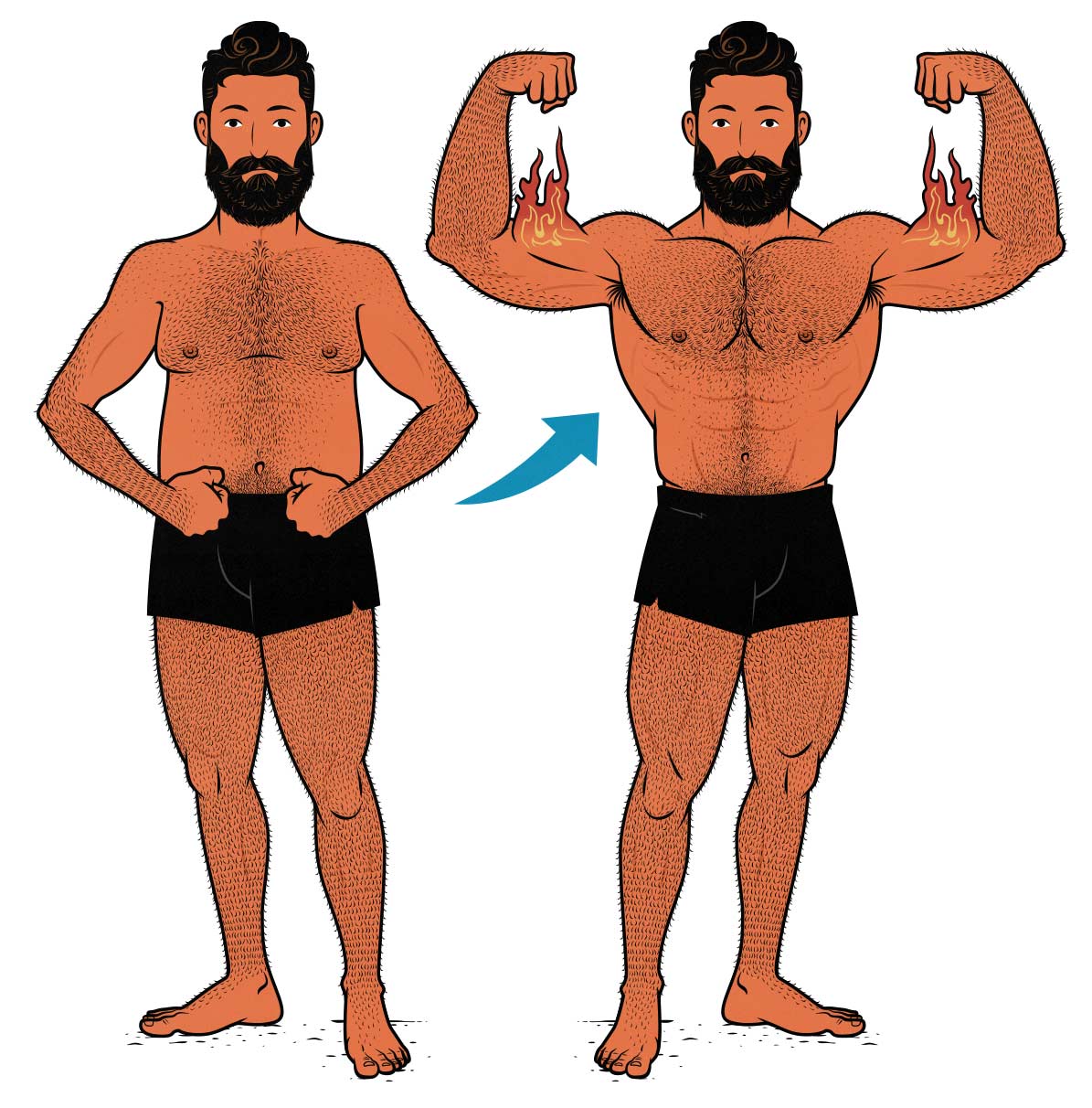
Why Aren’t You Losing Weight in a Calorie Deficit?
If you ask about why you aren’t losing weight in a calorie deficit, the common answer is: “Because you’re not in a calorie deficit. You need to eat fewer calories.” That’s not entirely wrong, and we’ll get into it, but it’s factually wrong.
You can maintain or even gain weight in a calorie deficit. In fact, there are several different ways this can happen, all of which make perfect scientific and logical sense. By shining light on these exceptions, we can fully illuminate the truth.

Reason #1: You’re Building Muscle
Burning a pound of fat gives us around 3,500 calories (study). Building a pound of muscle takes around 2,000 calories (research breakdown). So if you lose a pound of fat while gaining a pound of muscle, your weight will stay the same, even though you’ve created a calorie deficit of 1,500 calories.
This means you could actually gain weight while being in a calorie deficit. This happens all the time when people start lifting weights, eating a better diet, and living a healthier lifestyle. They’re in a small deficit, but their weight increases because they’re gaining more than a pound of muscle for every pound of fat they burn.
If you’re judging your progress based on the number you see on the scale, this can be discouraging. If yo think this might be happening, it’s much better to judge your progress by the strength you’re gaining in the gym. You could also track your waist circumference. If it’s going down, that’s a great sign you’re losing fat.
If you want to start losing weight, you can drive yourself into a deeper calorie deficit. That should be enough to get your weight moving down again. Mind you, if you’re building muscle while losing fat, why kick a gift horse in the mouth?
Reason #2: You’re Retaining Fluid
If you’re retaining more fluid than normal, you’ll weigh more than normal. There are a few reasons this can happen, and some of them are actually pretty good.
- Strenuous exercise: when you challenge your muscles, it damages them, making them inflamed. This inflammation is a good thing. Your body is sending in nutrients to repair and grow your muscles, causing them to swell and making them weigh more. This is called exercised-induced edema.
- More glycogen: your muscles store a type of fuel called glycogen. This glycogen is made out of sugar, which is made out of the carbs you eat. When you use your muscles, you burn through that fuel, causing a little bit of weight loss. When you eat carbs, you’ll refill those fuel tanks, causing a bit of weight gain. This can cause your body weight to fluctuate by a pound or two.
- High salt intake: when you eat more salt than your body needs, you’ll get thirstier than usual. Your body is asking for extra water to balance the extra sodium. When you drink that extra water, you’ll weigh more than usual for a while.
- Hormonal changes: this is especially common with women, whose hormones often fluctuate throughout the month. It can happen to anyone, though, causing you to hold onto different amounts of water, thus causing your weight to fluctuate.
You could imagine a situation where you’ve been following your diet properly, keeping yourself in a calorie deficit all week long. But, last night, you had a bunch of low-calorie but salty popcorn, got thirsty, and drank a bunch of water. That popcorn didn’t drive you into a calorie surplus, and you still burned off a bunch of fat, but you weigh 3 pounds more than last week, at least for a little while.

Reason #3: Inconsistent Weigh-Ins
You weigh different amounts at different times of the day. For example, most people lose a little over a pound while they’re sleeping. This is because they’re breathing out humid air (losing water) and converting oxygen into carbon dioxide (losing carbon atoms).
For another example, every pound of water you sweat out is a pound you lose on the scale. I live in the Caribbean, and I measured myself before and after going on a walk outside. In one hour, I lost over 3 pounds, most of which was sweat.
Plus, at different times of day, you’ll have different amounts of fluid in your bladder and different amounts of food working its way through your digestive system. This can easily account for a few pounds of weight fluctuation on the scale.
There are two solutions for this:
- Weigh yourself at the same time every week, ideally under similar circumstances. I would do this by weighing myself every Sunday morning, right after peeing and before having a glass of water. I would also eat fairly similar meals every Saturday night and go to bed at a similar time. This kept my weigh-ins fairly consistent.
- Weigh yourself every morning and use a rolling average. Instead of letting your entire week hinge on a single weigh-in, you could weigh yourself every morning and keep track of your average weight. For example, the calorie-tracking app, MacroFactor, tracks your average weight but biases the most recent weigh-ins, giving you a “trend weight,” and plotting it over time. Based on how your weight is trending, it will adjust your calorie recommendations. (If you want to try it out, you can get an extended free trial with our affiliate code: “b2b”.)
Or Maybe You Aren’t In a Deficit
You could be eating less food than usual, tracking every calorie, and be under your calorie target, and yet still not be in a calorie deficit. Here are two common reasons that can happen:
- Calorie Counting Isn’t Perfect: you can’t perfectly estimate how many calories you burn. Food labels have a margin of error. Verified food databases aren’t perfect. And we aren’t perfect, either. No matter how careful we are, we can never be perfectly accurate.
- Your Metabolism Can Change: Your metabolism will adapt as you get deeper into a cut. It should adapt. After all, you aren’t eating enough food to support your activity levels. It makes sense for your metabolism to slow things down. There’s a large genetic component to this, too. Some of us have more adaptive metabolisms than others.
What Should You Do?
A calorie deficit will cause you to lose weight—eventually. By definition, a calorie deficit is when you’re eating fewer calories than you’re using. There’s only so much muscle you can build and fluid you can retain. Eventually, the true depth of your deficit will be revealed.
Now, if you aren’t losing weight because you’re building muscle, you may want to ride that golden chariot for as long as you possibly can. If you’re making progress in the gym, you should probably keep doing what you’re doing. Every pound of muscle you gain will burn around 12 calories per day. If you can gain 20 pounds of muscle, that’s another 240 calories added to your metabolism.
If you aren’t losing weight, and you’d like to, you should probably reduce your calorie intake even further. You don’t need to know how many calories you’re eating. You don’t need to track anything. You just need to eat a little less. Try eating 200 fewer calories every day. I know this can be difficult.
Another approach is to increase your activity levels. The more exercise you do, the more steps you take, and the more time you spend on your feet, the more calories you’ll burn. However, this can be difficult, too, especially if your body is trying to hoard calories.
You could try eating more filling foods—more fibrous veggies, more fruits, more berries, more Greek yogurt with frozen strawberries, and more lean proteins. Sometimes, eating a better diet can make it easier to get into a calorie deficit. But your body isn’t dumb. It knows when it’s in a deficit.

Conclusion
It’s entirely possible to be in a calorie deficit and not lose weight. In fact, you can even gain weight in a deficit, at least for a while. One reason is that you could be building muscle, which is great. The other reasons have to do with fluctuations in body weight. So here’s what to do:
- If you’re getting stronger, keep getting stronger. If you’re gaining strength in the gym, your waist circumference is gradually shrinking, and your weight is holding steady (or even slowly increasing), you don’t have a problem. You’re probably experiencing body recomposition, building muscle and losing fat simultaneously. Keep at it.
- If you have a bad weigh-in, don’t stress. It’s normal for body weight to fluctuate. Keep doing what you’re doing for another week. See what the scale says next time.
- If your weight loss has truly plateaued, you’ll need to get back into a calorie deficit. To do that, try eating 200 fewer calories or burning 200 more. It can be hard either way, but this is the path you’ve chosen.
Alright, that’s it for now. If you liked this article, you’ll probably like our cutting guide over on Bony to Beastly. You might also like our newsletter, though be warned: it’s written for people interested in building muscle.






I mentioned #1 to a friend a few weeks ago and just came across this article – glad to see someone else coming to that conclusion! Good to see those studies re how many calories are in a pound of muscle, too – I was guessing before.
I’ve been following this site for years – appreciate your work, please keep it up.
Thank you, man! That means a lot. I’m really glad it was helpful.
That first reason is why I wanted to write the article. It’s a weird body recomposition phenomenon most people never think of.
Man I’ve been trying to lose weight for the longest time, and only recently started going to the gym to lift weights. I started seeing the number on the scale start creeping back up and was feeling really discouraged, so thanks!
Glad I could help!
Have you been tracking your waist measurement? That’s a simple and objective way to keep track of how much fat you’re losing. It also does a really good job of measuring visceral fat, so it tracks pretty well with health improvements.
If you want to take it even further, you could take a few more measurements, using the Navy Method. That will give you a rough idea of your body fat percentage, and it does a decent job of taking muscle mass into account.
Also, if you’re lifting weights, gaining strength, and seeing the number creep back up, I suspect you’re gaining quite a lot of muscle.